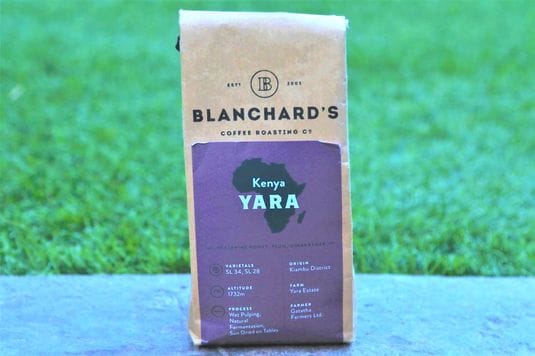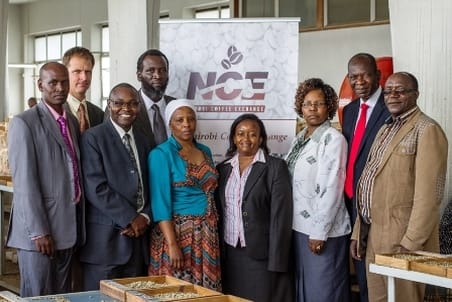
Rating: 9.0/10
Body: Smooth, juicy
Acidity: Crisp, tart
Notes: Lime, nutmeg, cinnamon
Aroma: Cranberry, chocolate
Kenya is one of the most beloved coffee regions in the world, churning out award-winning lots bursting with subtle flavors at an unprecedented pace. Despite accounting for less than 1% of the world's total annually produced coffee, Kenyan coffee has been thoroughly formative for the nation's own agriculture and economy. But the origins of Kenya's coffee successes may be just as multiplex as their impacts. Kenya's fruitful emergence onto the third-wave coffee scene in recent decades has often been attributed to a combination of unique processing methods and strict, governmental regulation of intranational coffee trade and production.

This is a picture of the Nairobi Coffee Exchange, or NCE. By law, Kenyan growers whose farms are smaller than five acres are mandated to organize and sell through a local cooperative. With over 150,000 estimated coffee farmers in total, and an average farm acreage of 0.5 to 3 acres, a large majority (85%, per the USDA/GAIN Annual Kenya Coffee Report) of Kenyan coffee farmers sell their cherry to co-ops, which then conduct sales and auctions facilitated by the NCE to, primarily, Germany, Belgium, Sweden, and the United States.
However, the regulations set in place by the NCE and Kenyan government have sparked controversy in recent years. Claims of price fixing, the emergence of "coffee cartels," and general distrust in the system have led many farmers and cooperatives to seek independence from the state-managed market. Many farmers seek to set their own prices and sell without the NCE or cooperatives as middlemen.
However, the regulations set in place by the NCE and Kenyan government have sparked controversy in recent years. Claims of price fixing, the emergence of "coffee cartels," and general distrust in the system have led many farmers and cooperatives to seek independence from the state-managed market. Many farmers seek to set their own prices and sell without the NCE or cooperatives as middlemen.
Despite the unrest and public outcry in the Kenyan coffee industry today, many farmers and co-ops are still going strong, producing spectacular lots. One of these achievers is Gatatha Farmers, Ltd., a group of farmers that formed in 1971 when they took over operation of a 640 acre property some twenty kilometers north of Kenya's capital of Nairobi. The Yara Estate lies around 1700 meters above sea level, and is among a collection of coffee and tea farms that make up an extensively developed agricultural belt in the Kiambu district, also home to a number of subsistence farmers.
This coffee is easily among the brightest I've ever had, with an intense and sweet citrus acidity followed by subtle and complex spice notes. Lime and currant notes finished with nutmeg and cinnamon, enveloped by a smooth, juicy body. Milk chocolate was also noticeable in cupping and in the aroma, which harmonized deliciously with delicate cranberry scents. I particularly enjoyed the Kenya Yara AA brewed in the Aeropress, with a shorter total brew time of around 1:30. The recipe that worked best for me used 23 grams of coffee; add 60 grams of water, bloom for 35 seconds, add rest of water for 10 seconds, and press for the remaining 45 seconds. I got some amazing and intense citrus with this brew; I highly recommend using a similar recipe and fine tuning to your preference.
This coffee is easily among the brightest I've ever had, with an intense and sweet citrus acidity followed by subtle and complex spice notes. Lime and currant notes finished with nutmeg and cinnamon, enveloped by a smooth, juicy body. Milk chocolate was also noticeable in cupping and in the aroma, which harmonized deliciously with delicate cranberry scents. I particularly enjoyed the Kenya Yara AA brewed in the Aeropress, with a shorter total brew time of around 1:30. The recipe that worked best for me used 23 grams of coffee; add 60 grams of water, bloom for 35 seconds, add rest of water for 10 seconds, and press for the remaining 45 seconds. I got some amazing and intense citrus with this brew; I highly recommend using a similar recipe and fine tuning to your preference.

Blanchard's Coffee Roasting Company is based in Richmond, Virginia, and has been roasting since 2005. We also tried their Guatemala San Rafael Urias Estate, Ethiopia Yirgacheffe Koke, and Quirk Coffee, all of which you can read more about on their website (https://blanchardscoffee.com). Their bags have got some great graphic design, effective and beautiful, and we highly recommend you check out some of the offerings they've got this holiday season. Thanks to Blanchard's for sharing these delicious coffees with us, and stay tuned for another review coming next week!
